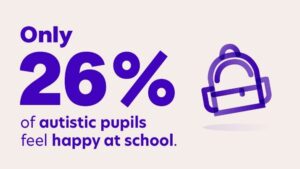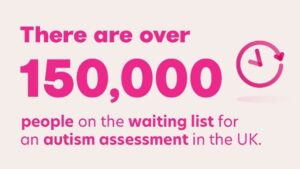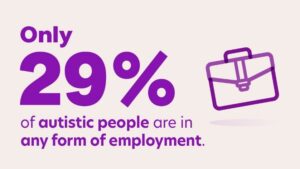World Autism Awareness Day – Supporting Neurodivergent Clients and Colleagues.
World Autism Awareness Day
Supporting Neurodivergent Clients and Colleagues.
(2nd April 2024)
World Autism Awareness Day was on 2nd April. This year marks the 17th Annual World Autism Awareness Day.
There is a focus on sharing stories and providing opportunities to increase understanding and acceptance of people with autism and fostering worldwide support. This year, the theme is being “committed to acting fearlessly for change”. To help create a world in which autistic individuals are fully supported, championed and celebrated, where we work together to achieve true acceptance.
I have a personal as well as professional interest in ensuring we support neurodivergent clients and colleagues effectively, as I have seen first-hand the difference that getting the right support in place for people can have on their life. It is becoming more difficult both for clients and colleagues to receive a diagnosis and to access the right support, we need to bear this in mind as the context within which we are working.
N.B. I am aware that whilst I have used the terminology autistic person, many people prefer to use the term Neurodivergence. Please do ask people what their preference is.

What is autism?
Autism is a developmental difference that affects how people communicate and interact with the world. It is not an illness or a disease and cannot be “cured.”
Characteristics include:
- Difficulty communicating and interacting with others
- Challenges understanding how others think and feel
- Sensitivity to lights, noise, unfamiliar situations, texture, and touch
- Repetitive behaviours or thought patterns
- Varied abilities and people may also have other conditions
Every autistic person is unique and with the right support and understanding in place people who are autistic can lead fulfilling lives (N.B. the national autistic society found that only 15% of people who are autistic work full time despite the fact that many people can and want to work.)[1]
It is estimated that 1 in 100 children are autistic.
Racial disparities and access to services
A recent report on the experiences of Black children with special educational needs aims to raise awareness and improve outcomes for Black children who remain over represented in SEND, yet least likely to receive adequate support, perpetuating a cycle of racial disadvantage. You can read more about this here:
READ REPORT | Black Child SEND
Unfortunately, as I write this we are also in a crisis in terms of support and diagnosis for neurodivergent people despite the publication of the Government’s Autism Strategy in 2021, the autism assessment crisis is continuing to worsen. Waiting times for assessment have soared since the COVID-19 pandemic and the number of children and young people (CYP) accessing autism services is now at a record high. This is a system under unsustainable pressure.
Please do read this report to find out more and for how we may be able to help change this. CoTN_Autism_Report_1.pdf (n8research.org.uk)

What difference does a diagnosis make?
Sharing with you a snippet of my daughter’s journey from school refusal, anxiety and depression to diagnosis and support and a change to a whole life trajectory I hope gives food for thought. This may sound extreme but I do not think we can underestimate the detrimental impact on young people of not getting the support they need in a timely manner on the trajectory of their lives. Please do bear this in mind when supporting our clients.

By the time my daughter was in her GCSE year she was managing to go to school about 75% of the time. Events had led us to CAMHS and after a couple of phone appointments her Care Co-ordinator identified that she could be autistic and referred her for assessment. The week before her GCSEs we received her diagnosis. This was a shock both to me and her, however it made perfect sense when we looked back over her life. It was too late for any support or adjustments to be made for her education but fortunately she managed to achieve the grades she needed for the next step of her journey. Had she not it would have had a huge detrimental impact on her life for a significant period of time.
Fast forward two years, with appropriate support from CAMHS and an EHCP (education and health care plan) in place at college, reasonable adjustments for exams and learning, we are in a completely different space. Educationally she is thriving and likely to achieve A grades at A level. This is so vastly different from her GSCE results. It will mean she can go to the university of her choice. She wants to get a first-class degree. This may well not have been possible without both a diagnosis and appropriate support; true potential wasted.
Our situation is not unique, it is repeated over and over and likely to be the experience of many of our clients. Ensuring we help them secure the services they need can quite literally change their lives.
Autism in the workplace
Effectively supporting autistic people in the workplace is something we want to achieve, and with reasonable adjustments, the right support and training for both us as an employer and the individual, we can continue to be the inclusive workplace we aim to be. Guides such as Employingpeoplewithautism.pdf can be helpful but we must remember that every autistic person is unique and so working in partnership with colleagues and access to work can ensure meaningful support is offered. I appreciate that this can be a challenging process, not least for the colleague, but working together, being honest about what we can and can’t do and being creative in our approach can ensure that we typically succeed.

Advice is always available from our People Partners, support from our Employee Assistance Programme and our Accessibility Network who are supporting us to be the best employer that we can be. Contact details are available on Insite.
Please note Insite is for colleagues only.
Let’s keep working to create a more accepting and inclusive world for autistic people, and take more steps to achieve our vision to create a world where everyone matters.
Sources:
Images about statistics are from: https://www.autism.org.uk/
[1] Redman, S. et al (2009). Don’t Write Me Off. London: The National Autistic Society p. 6
